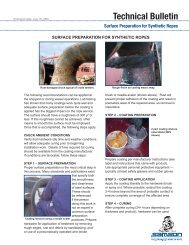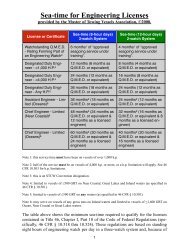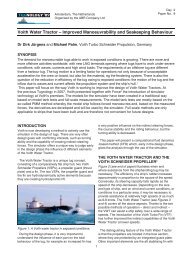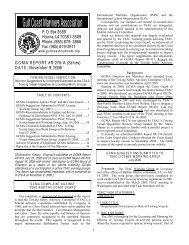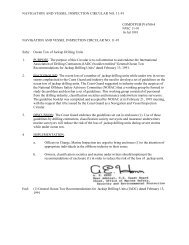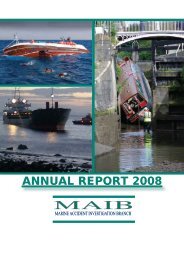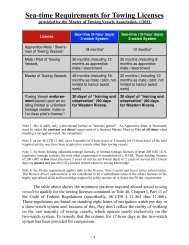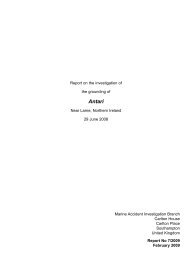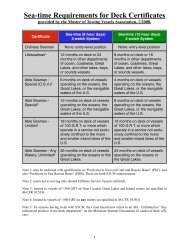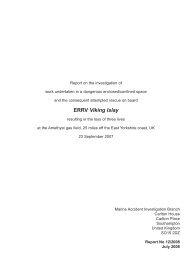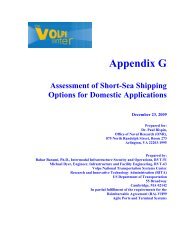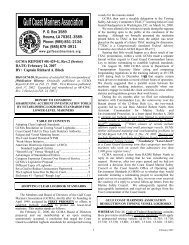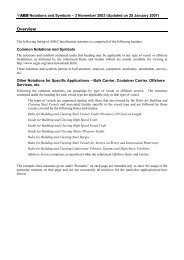Container-on-Barge Pre-Feasibility Study Final Report - Towmasters ...
Container-on-Barge Pre-Feasibility Study Final Report - Towmasters ...
Container-on-Barge Pre-Feasibility Study Final Report - Towmasters ...
Create successful ePaper yourself
Turn your PDF publications into a flip-book with our unique Google optimized e-Paper software.
To date, council members have identified the following technical and legal problems with<br />
operating a c<strong>on</strong>tainer-<strong>on</strong>-barge (COB) service:<br />
1. The need to easily obtain reliable, prompt and readily accessible informati<strong>on</strong> <strong>on</strong> barging<br />
costs, transit times and intermodal c<strong>on</strong>nectors.<br />
2. The need to identify an entity to oversee the operati<strong>on</strong> (i.e. bookings, scheduling,<br />
customer service, and bills of lading. This entity would also be charged with the<br />
resp<strong>on</strong>sibility of negotiating the service c<strong>on</strong>tracts with the barge companies and river<br />
terminals.<br />
3. The need to identify the insurance resp<strong>on</strong>sibility when handling multi-shippers and multishipments<br />
<strong>on</strong> <strong>on</strong>e barge.<br />
4. Dunning and equipping existing barges to handle c<strong>on</strong>tainers.<br />
5. Ensuring terminals al<strong>on</strong>g the inland waterways have the equipment, facilities and<br />
technical know-how to handle twenty and forty-foot c<strong>on</strong>tainers.<br />
The members of our shippers’ council have enthusiastically participated in our process and<br />
c<strong>on</strong>tinue to offer support as we try and diversify the commodity mix <strong>on</strong> the inland waterway<br />
system.<br />
PBSC Evaluati<strong>on</strong> of the Shipper Associati<strong>on</strong>s and the Shipping Act of 1984<br />
The Shipping Act of 1984 was reviewed for organizati<strong>on</strong>al requirements. It was deemed<br />
unnecessary to formally organize under the Act at this time. It is useful, however, to indicate the<br />
advantages and requirements of such organizati<strong>on</strong> when a group of shippers is prepared to<br />
negotiate internati<strong>on</strong>al pricing.<br />
The Shipping Act of 1984 recognized three distinct types of ocean intermediaries that represent<br />
shippers in negotiating service c<strong>on</strong>tracts. They are Freight Forwarders, N<strong>on</strong>-Vessel Operating<br />
<str<strong>on</strong>g>C<strong>on</strong>tainer</str<strong>on</strong>g> Companies (NVOCC) and Shippers’ Associati<strong>on</strong>s, which represent multiple shippers<br />
and can negotiate service c<strong>on</strong>tracts with carriers. A descripti<strong>on</strong> of these intermediaries can be<br />
found at < http://www.apl.com/assets/applets/osra.pdf >, “U.S. Trade: Clear Sailing in<br />
Unchartered Seas and <str<strong>on</strong>g>C<strong>on</strong>tainer</str<strong>on</strong>g> Shipping After Deregulati<strong>on</strong>.” 1<br />
The formati<strong>on</strong> of these entities provides certain anti-trust exempti<strong>on</strong>s allowing shippers in<br />
internati<strong>on</strong>al trade to discuss pricing under certain circumstances. The requirements for filing<br />
with the Federal Maritime Commissi<strong>on</strong> can be found at < www.fmc.gov >, Ҥ 1704.<br />
Agreements.” 2<br />
1 Hard Copy located in Appendix A.<br />
2 Summary is located in Appendix B.



